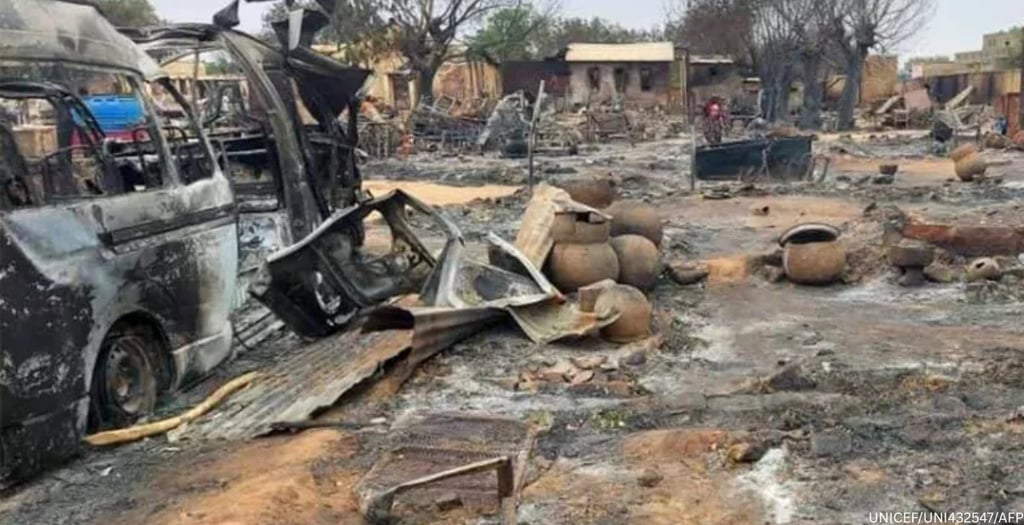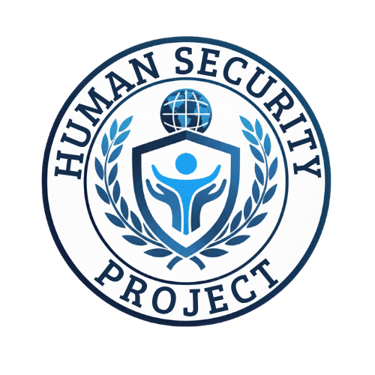The Sudanese People Need More Than Empty Words; They Need Action
The UAE, a key US ally, could end this suffering. Yet, the US government continues to fail to take any meaningful action to pressure the UAE to get its RSF proxy to stop its genocidal rampage.
Human Security Project
11/17/20256 min read


Advocates have warned about the risk of mass atrocities in El Fasher for over a year. In the past few weeks, the Rapid Support Forces (RSF) have captured the city and committed widespread massacres that spilled so much blood that the carnage was visible via satellite imagery. The RSF has not tried to hide its killing spree, as some fighters gleefully shared videos of mass killings on social media. These were not hidden crimes, but acts of violence perpetrated with the expectation of impunity.
The RSF was created as a paramilitary force by Sudan’s dictator, Omar al-Bashir, who was ousted in the civilian-led Sudanese democratic revolution of 2019. The RSF grew out of the Janjaweed militias responsible for the genocide in Darfur 20 years ago, as well as mass atrocities in the Nuba Mountains. For the last two years, the RSF has been embroiled in a war with its former compatriots, the Sudanese Armed Forces (SAF). Civilians have borne the brunt of the casualties as they have been systematically targeted by both armed actors and caught in crossfire. The horrors we are witnessing today in Darfur are the continuation, and possibly the end stage, of the genocide that began two decades ago.
What is so discouraging is that this massacre was preventable, and a key US ally could have stopped it from happening.
Multiple independent investigations have documented that the United Arab Emirates (UAE) is the largest supplier of arms, ammunition, drones, and logistical support to the RSF. This support has continued even after the US determined in January 2025 that the RSF was committing genocide. The UAE’s complicity in genocide was not a secret in Washington. Both the Biden and Trump administrations, as well as Congress, have been made fully aware through public reporting and US intelligence. Yet no meaningful pressure was applied on the UAE; there has been no diplomatic cost, no withheld weapons sales, and no reevaluation of the US-UAE security relationship.
When news of the latest massacres broke, a bipartisan group of Senators, including the Chairman and Ranking member of the Senate Foreign Relations Committee, issued a statement condemning the acts and even directly calling out the UAE for arming the RSF. However, none of those Senators–Jim Risch (R-ID), Jeanne Shaheen (D-NH), Tim Scott (R-SC), Chris Coons (D-DE), Todd Young (R-IN), and Cory Booker (D-NJ)–have supported legislation to prohibit US arms sales to the UAE until it stops arming the RSF.
Public statements do nothing for the Sudanese lying in mass graves, suffering from horrific sexual violence and torture, or fleeing their homes and languishing in displacement camps. The Sudanese people need real political courage, yet only a few policymakers have demonstrated any.
The US has several points of leverage over the UAE, especially their bilateral arms sales and defense agreements. Yet both Congress and successive administrations have failed to use this leverage.
Senator Chris Van Hollen (D-MD) and Representative Sara Jacobs (D-CA-53) have introduced a Joint Resolution of Disapproval, as well as bills in 2024 and 2025, to prohibit arms sales to the UAE until the US government can verify that Abu Dhabi is no longer providing materiel support to the RSF. However, no other Senators have supported this effort. It was only after the latest massacre that five Senators signed on to Senator Van Hollen’s bill. Unfortunately, none of the signatories to the recent public statement have signed onto the bill that would actually do something beyond express moral outrage.
Meanwhile, the Trump administration refuses to use its leverage amid ongoing massacres. Last week, Secretary of State Marco Rubio told reporters that “Something needs to be done to cut off the weapons and the support that the RSF is getting as they continue with their advances." Something needs to be done? Has the Secretary or President Trump exerted even minimal pressure on Abu Dhabi? Has President Trump spoken with the UAE’s President Mohammed bin Zayed about the RSF? Or is the administration content to issue platitudes while civilians are slaughtered?
Tragically, the Trump administration is following in Biden’s footsteps by allowing other political priorities to overshadow urgent human security concerns in Sudan.
The Biden administration and Congress opted not to pressure the UAE because they wanted to preserve Emirati support for Israel amid its genocidal campaign in Gaza. The Trump administration has largely ignored the crisis in Sudan, failing even to appoint a Special Envoy for Sudan as required by the 2025 National Defense Authorization Act. Additionally, President Trump is unlikely to pressure the UAE in any meaningful way as long as his family and inner circle continue to profit from billions of dollars in Emirati-linked business deals.
Human Security Once Again Ignored
Sudan is a perfect example of how human security concerns are consistently ignored in favor of short-term geopolitical priorities. Sudan is also a perfect case study in how ignoring human security crises ultimately undermines national and international security.
When mass atrocities are perpetrated and states are allowed to collapse, it is not only the people who suffer; the tragedy spills across borders. Mass displacement, the strengthening of extremist networks, and transnational crime and resource exploitation often follow. Violent extremism has plagued Sudan and the Sahel for years. Allowing Sudan–a state bordering seven countries–to become a failed state will open the door for extremists to gain a critical foothold in a resource-rich state with access to a major seaport on the Red Sea.
Sudan has a long history of fostering Islamist extremist elements. From the rise of Islamists in the 1989 coup that put Omar al-Bashir in power, to alliances with the Muslim Brotherhood, and the hosting of Osama bin Laden in the 1990s, there is a real risk that Sudan could become a safe haven for terrorist and violent extremist organizations. Sudan’s strategic Red Sea access could provide a stronger foothold for Iranian-backed elements in Yemen that control part of the Red Sea corridor. Iran has stepped up diplomatic engagements and extended support to the SAF, sending military aircraft, drones, and other weaponry, which some analysts believe is an attempt to establish a military presence in Port Sudan. Iran is not the only state looking to beef up its presence in the Red Sea. Russia has also expressed a strong interest in establishing a naval base in Port Sudan.
The US and European governments have spent considerable resources attempting to combat the rise of extremism across the Sahel. The threat of Russia’s growing security presence in the region is also of concern. Yet, the short-sightedness of partnerships with the UAE and other concerns allowed for the crisis in Sudan to spiral out of control.
The US government supposedly knows the importance of preventing mass atrocities. In 2019, President Trump signed into law the Elie Wiesel Genocide and Atrocities Prevention Act. This legislation enjoyed strong bipartisan support in Congress and was passed by unanimous consent in the Senate and with a vote of 367 to 4 in the House of Representatives. The act stated clearly that it shall be the policy of the US to “regard the prevention of atrocities as in its national interest.” Despite this legislation, the US has consistently failed to treat the prevention of mass atrocities as a national security priority.
The US cannot claim moral leadership and outrage when mass atrocities are perpetrated while actively avoiding the one point of leverage that could meaningfully impact the conflict.
Recommendations for the US Government:
Suspend US arms sales to the UAE until Abu Dhabi ceases support for the RSF.
This includes supporting Senator Van Hollen’s legislation, introducing new joint resolutions of disapproval on future UAE arms packages, and enforcing strict end-use monitoring. The US should prepare for additional measures, should the withholding of arms not be enough to sway Abu Dhabi.
Impose targeted sanctions and financial measures on UAE-based networks enabling RSF procurement and money laundering.
The US Treasury’s Office of Foreign Assets Control (OFAC) has already issued several sanctions against key Sudanese actors responsible for mass atrocities and threatening peace. OFAC has also sanctioned several companies in the UAE that have provided money and weapons to the RSF. But more must be done.
Impose targeted sanctions on companies, individuals, and intermediaries that are helping procure weapons for both the SAF and RSF.
Beyond the UAE, other countries, companies, and individuals are providing financial, logistical, and military support to the SAF and RSF. Additional sanctions on these networks must be imposed.
Publicly pressure the UAE at the highest levels.
The President must directly raise Sudan in conversations with MBZ and make clear that continued RSF support will threaten continued US partnership.
Appoint and empower a US Special Envoy for Sudan with clear authority, resources, and a mandate to coordinate international pressure.
The envoy should lead efforts to re-engage SAF and RSF in ceasefire negotiations, conduct high-level diplomacy to coordinate humanitarian support, and work with Sudanese civil society and armed actors to bring the war to an end.
Expand support for civilian protection and humanitarian access.
The disastrous and reckless decision to dismantle the US Agency for International Development has left a massive hole in humanitarian funding for Sudan. Despite promises to continue life-saving aid through the State Department, the US has still not managed to replicate the support that was previously given to international NGOs, UN agencies, and Sudanese civilian-led humanitarian efforts, especially the Emergency Response Rooms. More funding is needed immediately.
Prepare and support accountability measures now.
Sudanese civil society organizations have been documenting atrocity crimes perpetrated by both the RSF and SAF. But more support is needed. Technology, training, cyber and physical security, as well as data storage, are all needed. The US should also engage with social media companies to build strategies to monitor and archive footage coming out of Sudan, which may be used as evidence in future accountability measures.
Lift sanctions on the International Criminal Court.
The Trump administration has placed sanctions on the International Criminal Court, hindering its ability to conduct effective investigations and pursue justice and accountability for mass atrocity crimes perpetrated by armed actors in Sudan. These sanctions should be lifted to allow the court to pursue justice in Sudan.
Human Security Project
Delivering bold, actionable interventions to prevent violence, protect people, and build human security.
Connect
Engage
© 2025. All rights reserved.
